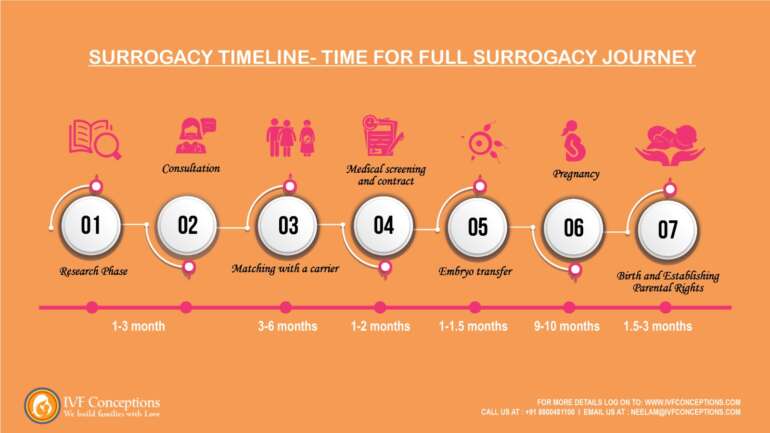How Does Gestational Surrogacy Work in Georgia? Step-by-step Guidance

For single individuals or couples pursuing surrogacy, the entire journey involves going through several key steps facilitated by the agency. The process begins with an initial call or email inquiry to the surrogacy agency and culminates with the birth of the longed-for baby. In this guide we will learn about how does Gestational Surrogacy work in Georgia, Step-by-Step.
- Book an online appointment: Get a free online consultation.
- Call\W:+91-8800481100 Email:neelam@ivfconceptions.com
Additional Guides for Surrogacy in Georgia
What are the Starting Steps for Surrogacy Process in Georgia?
How Much Does Surrogacy Cost in Georgia Country
Surrogacy for Hetero Couples in Georgia Europe
On average, the complete surrogacy process takes approximately 15-18 months from start to finish:
Let’s take a closer look at the specific steps involved in navigating the entire surrogacy journey from the first consultation through becoming parents.
Outlines the surrogacy process timeline for intended parents and how does Gestational Surrogacy work in Georgia:
| Stage | Description of Stage | Duration |
|---|---|---|
| Research Phase | Explore family building options and decide on surrogacy. | Personal timeframe |
| Consultation and Application | Choose a surrogacy agency, sign agreement, and start embryo creation (if needed). | 1-3 Months |
| Matching | Agency finds and presents potential gestational carriers. Meet and decide on a match. | 3-6 Months |
| Medical Screening and Contracts | Carrier undergoes medical and psychological screening. Sign surrogacy contract. | 1-2 Months |
| Embryo Transfer | Prepare for embryo transfer. Success may take multiple attempts. | 1-1.5 Months |
| Pregnancy | Gestational carrier’s pregnancy, approximately 40 weeks. | 9-10 Months |
| Birth and Postpartum | Baby’s birth, establish parental rights, and postpartum period. | 1.5-3 Months |
This is how surrogacy process in Georgia and surrogacy timeline look like:

Now, we will talk about the Surrogacy Process in Georgia in Detail step-by-step for better understanding How actually Surrogacy works and Steps involved in the process. Let’s start with the First Step
1.Choose the country where surrogacy will take place
Georgia or any other international countries based on your specific need and legal framework of the surrogacy country
2. Preparation of Legal documents to get started!
In the first stage, intended parents contact the agency and get advice about how does surrogacy work legally. To start the program, intended parents need 2 documents:
- Passports for both IPs
- Marriage Certificate with an Apostille *(legalization)
Per Georgian regulations, in order to be eligible for surrogacy program, couple needs to present marriage certificate (apostilled/legalized document itself, not notarized photocopy of it) showing at least one year in marriage.
Important note: Names on marriage certificate should match names on passports. If there has been any change in person’s identification info after marriage (for example, adding family name, etc.) and passport has been obtained after such change, corresponding document (apostilled/legalized) confirming change of the name issued by official public institution (for example, passport office, bank, rent least, etc) should be provided.
If couple does not have official marriage certificate of at least one year, the other proof of living together as partners can be accepted as follows ( at least one is needed but if you have more, it is good as it help notary officer to accept you as a couple):
- Letter from the Financial Institute or notarized agreement confirming the couple having joint credit/financial loan taken at least one year ago.
- Letter from the bank confirming that the couple owns joint bank account that has been active for at least one year and it shows transactions made together or separately by each of them.
- Letter from the Court that confirms that couple leave together of at least one year.
- Notarized marriage agreement.
- Confirmation document showing that couple live together on the same address of at least one year.
- Certificate from the medial center confirming that the couple has undergone fertility treatment in order to become parents and information about unsuccessful treatment/attempts. This fact also should be of at least one year duration.
* Apostille is an international form that confirms the authenticity of a document internationally.
3. Program selection
There are different infertility treatment options- using surrogate motherhood:- surrogacy with own eggs or egg donor surrogacy or frozen surrogacy. To choose the right program, we will ask you to send the Pre-IVF Tests reports for the both intended parents.
- Surrogate motherhood using own eggs – if an intended mother has a good amount of eggs, and an intended father has normal sperm count. It is advised to have good AMH value for female parent.
- Surrogate motherhood using donor eggs – if intended mother has low AMH, high age, or medical condition which make it hard to use her own eggs.
- Frozen Embryos Surrogacy– If you have already existing embryos and need to be transferred to the surrogate mother.
4. Visit to Georgia
Intended parents to come for 3-4 working days in Georgia. During this visit IPs, meet the clinic manager, infertility doctor, sign consent, agreement, make POA, give semen samples, and choose an egg donor. The coordinator informs about the visit plan in advance.
The coordinator provides intended parents with a detailed plan for their upcoming visit in advance. This visit typically involves the following key steps:
- Arrival : Upon landing, the intended parents are greeted by a personal coordinator at the airport.
- Medical Consultation: and Testing The couple undergoes blood testing for infectious diseases like HIV, syphilis, and hepatitis B/C. Their blood type, Rh factor, and karyotype are also determined. The intended mother provides a blood sample for hormone evaluation.
- Sperm Donation : The intended father provides a semen sample. If the sample meets quality standards, it is cryopreserved for future use. If the sample is suboptimal, the doctor recommends treatment or using fresh semen.
- Ovarian Stimulation Protocol : (If Using Intended Mother’s Eggs) If using the intended mother’s eggs, the doctor prescribes an ovarian stimulation regimen with hormonal medications. This stimulation cycle lasts 10-14 days, requiring the intended mother to return for monitoring.
- Notary Appointment : All parties review and agree to the legal contracts and terms surrounding the surrogacy arrangement. This outlines the roles, responsibilities, and rights of the agency, intended parents, and surrogate.
5. IVF with or without Egg donor- Embryo Creation/Cultivation
From the retrieved eggs, the embryologist carefully selects the highest quality ones to fertilize with the intended father’s sperm. The developing embryos are closely monitored, and genetic testing is performed. After evaluating the results, between 1-3 viable and genetically normal embryos are then transferred into the gestational surrogate’s uterus.
Embryo Development: The eggs are fertilized through intracytoplasmic sperm injection (ICSI) and cultured to the blastocyst stage, which typically takes 5-6 days. Embryologists examine the embryos and select the highest quality ones with even cell division and no structural abnormalities.
- The intended mother’s own eggs, either through a synchronized cycle with the surrogate or without synchronization by freezing embryos first.
- Donor eggs, in which case the donor and surrogate undergo synchronized hormonal preparation.
- Preimplantation Genetic Testing (PGT)
At the blastocyst stage, the selected embryos undergo PGT to screen for chromosomal abnormalities like Down syndrome with 99.7% accuracy. PGT also determines the embryo’s sex. - Surrogate Preparation: 10-14 days prior to the embryo transfer, the gestational surrogate takes hormonal medications to prepare her body for pregnancy by optimizing the uterine lining.
- Embryo Transfer: During the optimal “implantation window,” 1-3 embryos are gently transferred into the surrogate’s uterus through a painless procedure. The intended parents do not need to be present.
- Pregnancy Test: Around 10 days after transfer, the surrogate takes a pregnancy test measuring human chorionic gonadotropin (hCG) levels to detect if implantation was successful. If not, the cycle can be attempted again starting from the surrogate preparation phase.
6. Surrogate Pregnancy monitoring
Some Additional Resources to Read:
Guaranteed Surrogacy in Georgia
How Does Gestational Surrogacy Work in Georgia? Step-by-step Guidance
Surrogate Mother Cost in Georgia
Pregnancy Monitoring Once pregnancy is achieved, the surrogacy agency and clinic take full responsibility for closely monitoring the surrogate mother’s health and the baby’s development. Throughout the pregnancy, the surrogate undergoes comprehensive prenatal care:
- At least 10 ultrasound scans at scheduled intervals
- Two prenatal screening tests
- Regular blood testing
- Tests to ensure no smoking or alcohol use
- Clinic visits for the doctor to evaluate her condition and adjust any medication dosages as needed
The typical pregnancy monitoring schedule is as follows:
First Trimester
- Ultrasound 12 days after positive pregnancy test
- Ultrasound every 2 weeks until 12 weeks
Second Trimester
- 11-12 week ultrasound + first prenatal screening
- 16-17 week ultrasound + second screening
- 21-22 week ultrasound
Third Trimester
- 30 week ultrasound
- The surrogate then relocates to be near the hospital for delivery around 32-34 weeks for twin pregnancy or 34-36 weeks for singleton pregnancy
- Hospital admission for childbirth
This rigorous monitoring protocol ensures both surrogate and baby receive comprehensive prenatal care and any potential issues can be swiftly addressed.
7. Birth visit
Birth Visit Approximately 10-14 days before the expected due date, the intended parents arrive and are comfortably settled into an apartment with maid service as they prepare for their baby’s arrival.

Baby Birth
- After delivery, the newborn is immediately placed skin-to-skin on the mother or father’s chest. This allows bonding, warmth since the baby was in the 37°C womb, and an exchange of beneficial bacteria to start building the infant’s immunity.
- The intended/biological mother can be present for labor and delivery, or join just before the birth if preferred.
- The gestational surrogate signs a waiver relinquishing parental rights and does not have contact with the baby unless the intended parents consent.
Hospital Stay
- For an uncomplicated vaginal delivery, the family stays 3 days in the hospital’s private family suite.
- For a C-section, the stay is up to 5 days.
- The suite is equipped with a crib, bathing facilities, etc. Staff assists with newborn care guidance like feeding, bathing, etc.
- Supplies like diapers, clothing, and essentials are provided.
Post-Discharge Care
- After leaving the hospital, the family returns to their apartment residence for 3-4 more weeks as legal paperwork is completed.
- The apartment has all the necessary baby furniture and supplies.
- A pediatrician visits weekly to monitor the newborn.
- Housekeeping services allow the parents to focus fully on their new baby.
8. Paperwork for Baby Citizenship and Passport
- Obtaining Baby’s Citizenship and Travel Documents
In the final stage, the intended parents legally establish their parentage and obtain all necessary documents for their baby to travel home safely. This process takes around 2-3 weeks, depending on the parents’ country of origin, and your embassy back log.
Document Preparation The parents will need to provide:
- Their valid passports
- Marriage certificate with apostille
- Proof of their citizenship
The lawyers then assist with preparing:
- The baby’s birth certificate (issued by registrar using parents’ translated documents, hospital records, surrogate’s statement)
- Certificate confirming the genetic relationship between parents and child.
- DNA Testing
In most countries, like USA might bask for DNA link between the baby and at least one of the intended parents.
- Obtaining Baby’s Travel Document
Using the passports, marriage certificate, birth certificate, and genetic relationship certificate, the embassy or consulate issues a travel document/passport for the baby to depart for the parents’ home country.

The agency provides comprehensive guidance throughout this process to ensure the intended parents can establish legal parentage and depart safely home as a family. So, if you are wandering how does Gestational Surrogacy work in Georgia, Contact us for Free Consultation.
If you’d like to learn more about IVF, Egg Donation, or surrogacy services globally, check out the rest of our website at Georgia Surrogacy Agency. We offer legally secure and affordable surrogacy consulting services for FREE.
Our team has over 14 years of experience facilitating surrogacy arrangements, egg donation, and serving as an advocacy resource for infertile couples and LGBTQ individuals seeking to build families.
For more resources on IVF and Surrogacy, browse our other web page- IVF Conceptions and https://www.completesurrogacy.com/
References used:
